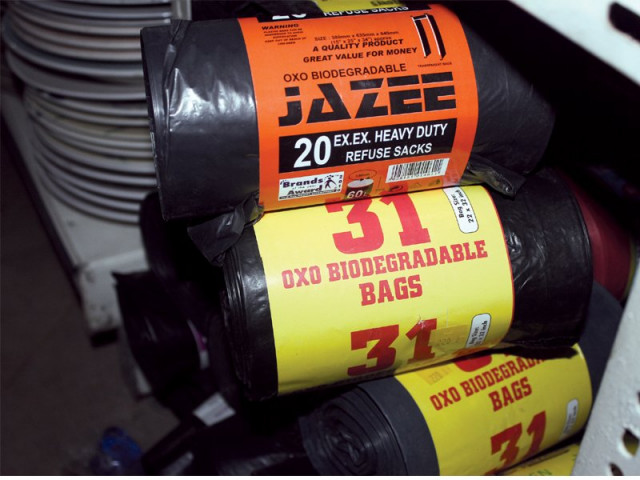Plastic bag ban: Lack of enforcement only obstacle to eco-friendly capital
Manufacturers concerned by additional cost that may see clients opt for regular bags.

Biodegradable trash bags at a local general store. PHOTO: WAQAS NAEEM/EXPRESS
Almost two-and-a-half months after a ban on non-degradable plastic bags officially took effect in the capital, the spirit to adopt environmentally friendly alternatives remains buoyant, yet there is little to show in terms of concrete enforcement steps.
The Pakistan Environmental Protection Agency (Pak-EPA), the country’s federal level environmental watchdog, is trying to drum up support from the business community, the provinces and consumers to change the culture of plastic bag use.
Financial constraints, however, have limited Pak-EPA’s efforts to raise awareness about the harmful effects of plastic bags to occasional seminars and a largely ineffective “Say NO to plastic bags” campaign.
Consequently, shopkeepers and customers in markets around Islamabad have expressed a general lack of awareness about the Prohibition of Non degradable Plastic Bags Regulation 2013, which was notified in January and became effective on April 1. However, when asked if they would prefer to use a plastic bag that causes less harm to the environment, most replied in the affirmative.

It might be a stretch to expect consumers to start asking shopkeepers for “oxo biodegradable” plastic bags, the alternative that Pak-EPA is trying to introduce to the market. Nonetheless, Pak-EPA Director-General Asif Shuja believes the capital’s educated residents would have a greater inclination to make the switch.
Shopkeepers interviewed by The Express Tribune seemed apprehensive about the alternative to the regular plastic bags, particularly in relation to the additional costs that would have to be incurred, but none of them rejected the idea outright. The oxo biodegradable bags cost between Rs7-13 more per kilogram than the regular bags.
Shuja said Pak-EPA’s field inspectors, including a Capital Development Authority (CDA) Enforcement Wing representative, will start doing rounds in the markets from July to check on the shopkeepers’ level of compliance with the regulation.
Using equipment provided by the UK-based Oxo-Biodegradable Plastics Association, the inspectors will also check if the oxo biodegradable bags being sold adhere to international standards, he added.
The severity of the plastic bag menace can be gauged by looking at the numbers. If Pak-EPA’s estimate of average plastic bag consumption in Pakistan is projected onto Islamabad, the figure comes to around 350 million bags per year. In the absence of an efficient waste disposal system, these plastic bags litter the capital’s streets, clog the drains, line the streams and become a road safety risk during windstorms.
Nevertheless, there is hope that the supply-side may adopt the change, especially if Pak-EPA maintains a tight handle on enforcing the regulation.
According to the minutes of a meeting held between Shuja and some of Islamabad’s plastic bag manufacturers on May 2, the manufacturers said they were ready to produce the oxo biodegradable bags because the manufacturing process was very similar.
The oxo biodegradable bags use one to three per cent of an additive called olefin, which allows oxygen to break down the plastic much faster than normal.
However, they were concerned that the five to nine per cent additional cost of production may see their clients opt for other companies producing regular bags. They also requested Pak-EPA to speed up the authorisation process by which a company would be allowed to provide quality-ensured olefin to local manufacturers.
Shuja said an independent committee within Pak-EPA was currently scrutinising applications for the authorisation and added that renewed efforts were being made to get the government to waive off a 6 per cent duty on olefin to make it more affordable.
He said the Pak-EPA was supporting the provinces, where the bulk of plastic bag manufacturing takes place, to adopt the ban. He said the regulation’s draft text would be made available to the provincial administrations so as to avoid unnecessary mulling over technical guidelines.
Meanwhile, a few local and foreign outlets in Islamabad have already adopted the oxo biodegradable bags. A private company is selling biodegradable garbage bags at super stores while the Utility Stores Corporation is expected to start using the new bags soon.
Published in The Express Tribune, June 10th, 2013.



















COMMENTS
Comments are moderated and generally will be posted if they are on-topic and not abusive.
For more information, please see our Comments FAQ